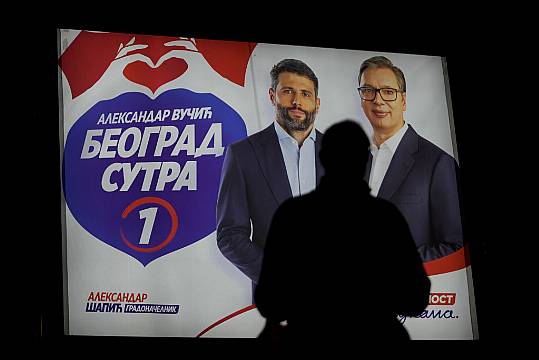Voters in Serbia are casting ballots in a re-run election in the capital, Belgrade, and dozens of other cities and towns, with ruling right-wing populists seeking to cement their already vast hold on power.
The vote in Belgrade is being repeated after reports of widespread irregularities last December triggered political tensions and accusations that President Aleksandar Vucic’s Serbian Progressive Party rigged the vote.
Populists have denied the accusations but still scheduled a repeat ballot.
Also up for grabs on Sunday are more than 80 municipal councils and city halls in two other key cities: the northern regional centre of Novi Sad and Nis in the south.

Mr Vucic is formally seeking to have his troubled nation join the European Union but has steadily drifted away from pro-EU democracy values while nurturing close ties with Russia and China.
The populists have presented themselves as the only political force capable of running the country and keeping it safe at a time of global turmoil.
Pro-Western opposition groups have accused Mr Vucic of crime links, rampant corruption and a crackdown on democracy.
But a wide alliance that was behind big anti-government street protests last year has splintered and turned against each other, fuelling apathy among Serbia’s 6.5 million voters.
Mr Vucic’s governing party is seen as the favourite in Sunday’s poll.
It has for more than a decade controlled all levels of power in Serbia, so if the opposition manages to wrest away at least some of the local councils, not to mention in big cities, it would be a significant shift.
The opposition groups split over whether to take part in the ballot or press on with demands for free and fair elections. Those running in Belgrade campaign under the slogan: “We choose to fight!”

International election observers have said the December election, which also included a parliamentary vote, was held in “unjust conditions”, in part because of the president’s involvement and systemic advantages for the ruling party.
A report by an office of the Organisation for Security and Co-operation in Europe said the ballot was “marred by harsh rhetoric, bias in the media, pressure on public sector employees and misuse of public resources”.
Local election observers have said not much has changed for Sunday’s vote despite a set of recommendations listed by international observers after the December balloting.
Fraud allegations in Belgrade included reports that voters from other regions in the Balkan country and from neighbouring Bosnia were bussed into Serbia’s capital to vote for Mr Vucic’s party.







